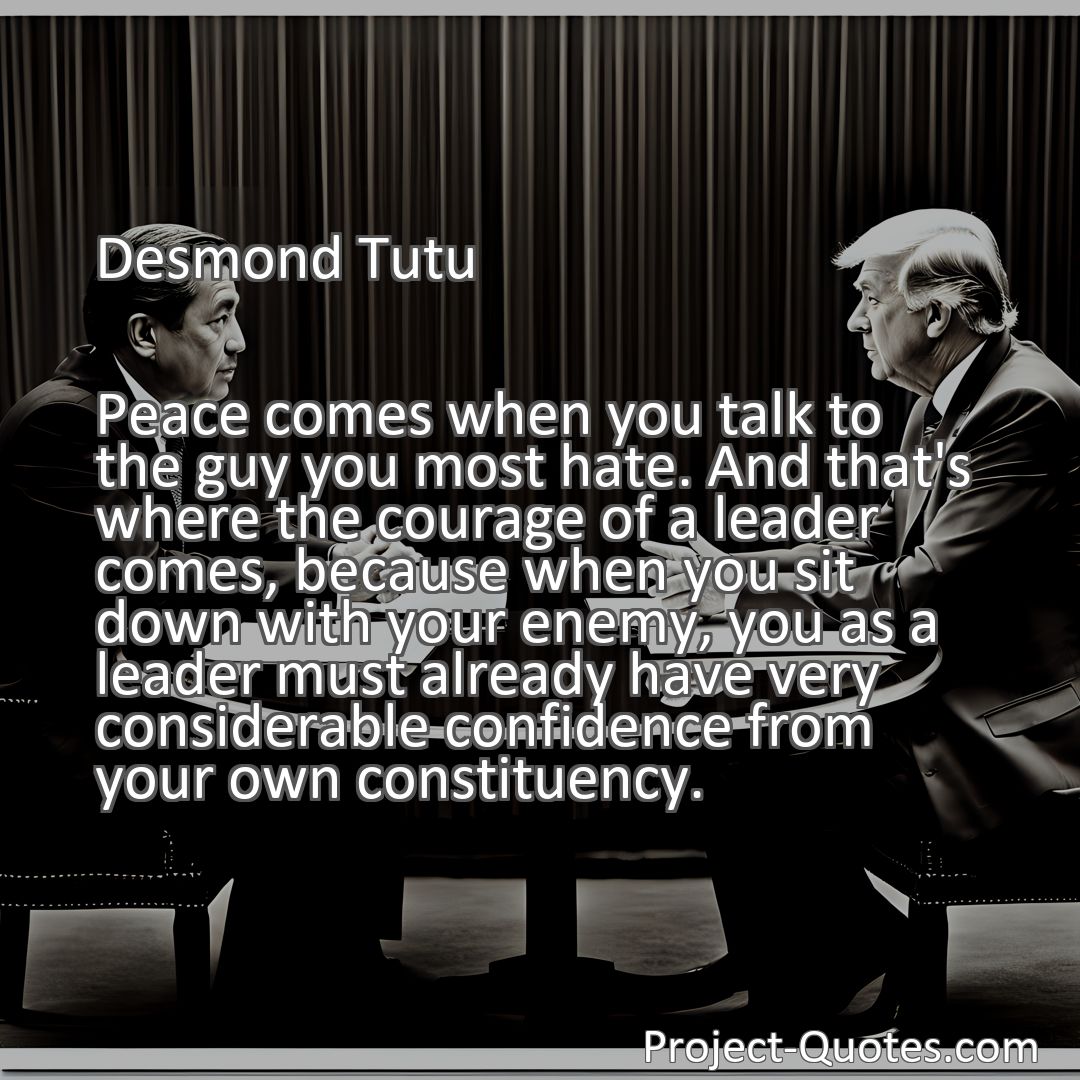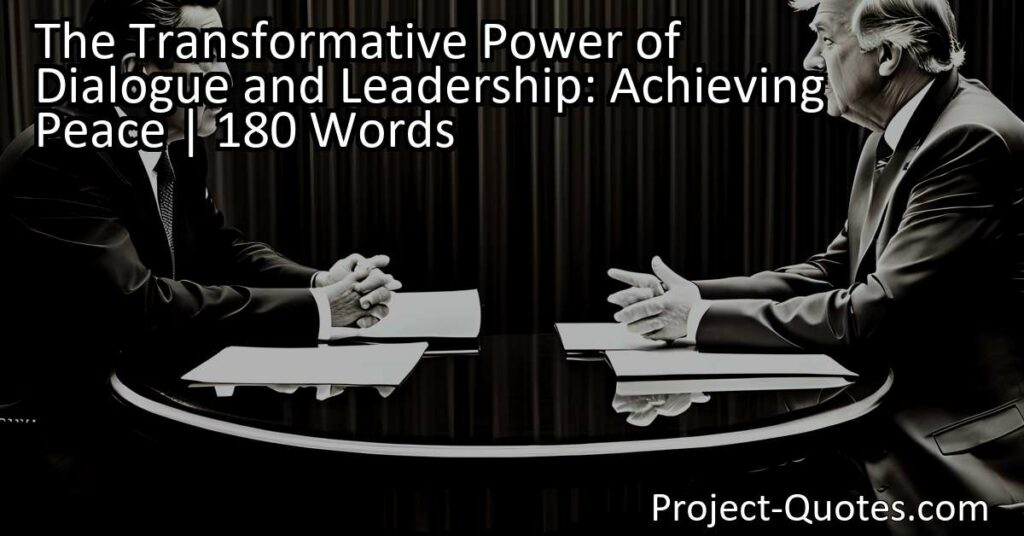Peace comes when you talk to the guy you most hate. And that’s where the courage of a leader comes, because when you sit down with your enemy, you as a leader must already have very considerable confidence from your own constituency.
Desmond Tutu
The Transformative Power of Dialogue and Leadership: Achieving Peace | 180 WordsTutu boldly asserts that true leadership is demonstrated when one has the courage to sit down with their most despised enemies. By building trust within their own community, leaders can effectively convey the necessity of dialogue and its potential to achieve lasting peace. By consistently demonstrating integrity and a commitment to justice, leaders strengthen their position as a mediator and empower their community to embrace the transformative power of dialogue.
Table of Contents
- 1 Peace comes when you talk to the guy you most hate. And that’s where the courage of a leader comes, because when you sit down with your enemy, you as a leader must already have very considerable confidence from your own constituency.
- 2 Desmond Tutu
- 3 Meaning of Quote – Peace comes when you talk to the guy you most hate. And that’s where the courage of a leader comes, because when you sit down with your enemy, you as a leader must already have very considerable confidence from your own constituency.
- 4 Freely Shareable Quote Image
- 5 Related
Meaning of Quote – Peace comes when you talk to the guy you most hate. And that’s where the courage of a leader comes, because when you sit down with your enemy, you as a leader must already have very considerable confidence from your own constituency.
The Power of Dialogue and Leadership in Achieving Peace
Introduction :
In the quest for peace, the simple act of engaging in conversation with our adversaries holds a profound significance. These words, spoken by Archbishop Desmond Tutu, highlight the essential role that dialogue plays in resolving conflicts and fostering understanding. As a highly respected leader and advocate for justice, Tutu emphasizes the courage required to engage with those we may hold animosity toward. This essay explores the transformative power of dialogue, how leaders can navigate such conversations, and the importance of building trust and confidence within their own communities.
The Transformative Power of Dialogue :
In a world often characterized by division and hostility, the power of dialogue cannot be underestimated. When we genuinely engage in conversation with those we perceive as adversaries, we lay a foundation for understanding, empathy, and ultimately, peace. Dialogue serves as a catalyst for challenging assumptions, dispelling misunderstandings, and uncovering common ground that may have previously been overlooked. By listening to and acknowledging the experiences and perspectives of the other side, we open ourselves up to the possibility of transformative change and reconciliation.
Leadership and the Courage to Engage :
Tutu boldly asserts that true leadership is demonstrated when one has the courage to sit down with their most despised enemies. However, this courage is not fueled by blind hope or naivety but by the leader’s unwavering confidence from their own constituency. By building trust within their own community, leaders can then embark on the challenging path of dialogue without fear of alienating their supporters. This confidence stems from a leader’s ability to effectively communicate their intentions, goals, and values to their constituency, ensuring that the motivation behind engaging with adversaries is understood.
A leader should strive to engender trust within their community by consistently demonstrating integrity, compassion, and a commitment to justice. Only then can they effectively convey the necessity of dialogue and its potential to achieve lasting peace. By cultivating confidence in their constituents, leaders strengthen their position as a mediator and empower their community to embrace the transformative power of dialogue.
Navigating Difficult Conversations :
Entering into dialogue with the person or group we harbor animosity towards can be an immensely challenging task for any leader. Such conversations require immense emotional intelligence, an open mind, and a genuine willingness to understand the other side. It is crucial for leaders to approach these encounters with humility and empathy, recognizing the inherent dignity of the individuals they engage with, even if they vehemently disagree.
To successfully navigate difficult conversations, leaders must foster an environment that encourages respectful and constructive dialogues. This can be achieved by creating safe spaces for individuals to express their opinions without fear of judgment or reprisal. By facilitating active listening and valuing diverse perspectives, leaders set the stage for productive exchanges that can lead to understanding and consensus.
It is also important for leaders to be prepared for resistance and hostility during these conversations. Adversaries may be skeptical of a leader’s intentions or perceive any act of engagement as a sign of weakness. Demonstrating emotional resilience and patience, leaders must persist in their commitment and consistently reinforce the tools of dialogue.
Building Trust and Confidence :
To have the confidence to engage in dialogue with adversaries, leaders must foster trust and confidence within their own community. This requires a consistent display of authenticity, transparency, and accountability. By maintaining open and honest communication channels, leaders can create an atmosphere of trust where individuals feel heard, respected, and valued.
Additionally, it is vital for leaders to ensure that their constituents understand the long-term benefits of dialogue and the potential impact it may have on promoting peace and cooperation. Leaders must communicate their intentions clearly and consistently to avoid any misconceptions.
Transparency is equally crucial in demonstrating that dialogue is not an attempt to appease or compromise core principles or values. Rather, it is a strategic and deliberate effort to address conflicts and find mutually beneficial solutions.
Conclusion :
Archbishop Desmond Tutu’s quote serves as a powerful reminder that genuine peace can only be achieved through dialogue and understanding. Leaders play a crucial role in this process, as their courage and confidence can inspire others to embrace the transformative power of conversation. By fostering trust and actively engaging with adversaries, leaders create opportunities for reconciliation and cooperation. Let us draw inspiration from Tutu’s words and work towards a world where talking to our foes is seen as a testament to leadership rather than weakness.
I hope this quote inspired image brings you hope and peace. Share it with someone who needs it today!


